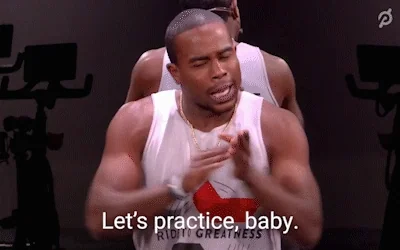Using phrasal verbs makes your speech more natural and fluent. Many idioms are built on phrasal verbs.
Phrasal verbs with "get" are very common. "Get" is one of the most flexible verbs — when combined with different prepositions, it can make the meaning of the verb entirely different.

The Most Common Phrasal Verbs with "Get"
There are many expressions with het that you come across very often:

Get up: rise from bed
Example: I usually get up at 7 a.m.

Get along (with someone): have a good relationship
Example: I really get along with my new colleagues.

Get back (to someone/something): return a message or call, return to a previous place or condition
Example: I’ll get back to you later with the details. / I'll get back to my homework after dinner.

Get over: recover from something (for example illness, disappointment)
Example: It took her a few weeks to fully get over this nasty virus.
Quiz
After the vacation, it was hard to ___ my usual work routine.
Phrasal Verbs with "Get": Problem Solving
Use these expressions to sound natural when talking about problem-solving.
Get by (on): survive with limited resources, especially financially
Example: It’s hard to get by on minimum wage.

Get through: complete or survive something tough
Example: We got through the exam in one piece.

Get through to (someone): Reach or make contact with someone during difficulty
Example: I finally got through to the technical support helpline.

Get out of: escape a bad situation
Example: She managed to get out of her work contract by finding another job.
Get ahead of: surpass or outpace someone
Example: He’s really trying to get ahead of his peers with higher test scores.
Quiz
It's hard to ___ such a small salary.
Phrasal Verbs with "Get": Rules & Punishments
Use these phrases to talk about avoiding rules and being punished:
Get off (with): avoid punishment or receive a light one
Example: He got off with just a community service order and no prison time.
Get away with: do something wrong without being caught
Example: She got away with plagiarizing her thesis.

Get called out (on): be challenged or criticized by someone else
Example: He got called out on his lies.
Get busted (for): be caught doing something wrong (informal)
Example: He got busted for illegal downloads.

Get written up: receive formal disciplinary action
Example: She got written up by her boss for missing the deadline.

Get around: avoid a rule or do something that isn't allowed in a sneaky way
We found a way to get around the security system with this new app.
Quiz
He tried to ___ the school’s dress code by wearing a jacket over his hoodie.
Phrasal Verbs with "Get": Work and Professioanlism
Get ahead: advance professionally
Example: You need strong networking skills to get ahead in this field.

Get on with: continue doing a task
Example: Let’s get on with the project.
Get around to: finally do something
Example: I never got around to writing that report.

Get out of: avoid a responsibility
Example: He’s always trying to get out of doing overtime.
Get down to: start seriously doing something
Example: We need to get down to business on this project.

Get bogged down (in): become too involved or stuck
Example: Don’t get bogged down in the minor details when you write this report.
Quiz
I really need to stop procrastinating and __________ my homework.
Take Action

Your feedback matters to us.
This Byte helped me better understand the topic.
